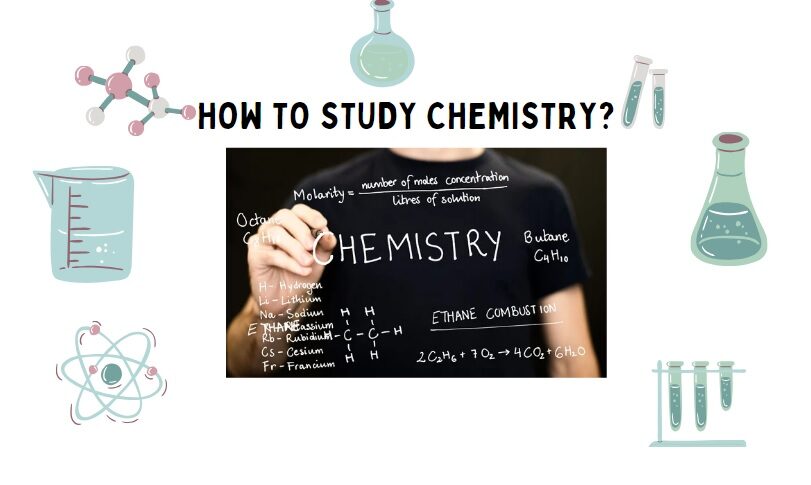
In this post, we’ll delve into the art of how to study chemistry and explore effective strategies to help you succeed in this captivating field of science. Whether you’re a student, a chemistry enthusiast, or someone looking to improve your understanding of the subject, this post will provide valuable insights.
-
Grasp the fundamentals of chemistry:
Chemistry is rooted in fundamental principles. Make sure you possess a strong grasp of basic concepts like atomic structure, periodic trends, chemical bonding, and stoichiometry. If these ideas pose a challenge, explore additional resources like textbooks, online tutorials, or video lectures to fortify your comprehension.( for more info)
-
Organize your study materials of chemistry:
Create a well-structured study plan and methodically arrange your notes, textbooks, and supplementary materials. Categorize different topics, equations, and reactions clearly. This systematic approach simplifies the process of reviewing and locating information during your study sessions.
-
Actively engage with the content:
Mere passive reading won’t suffice for effective chemistry study. Actively involve yourself by taking notes, summarizing key points in your own words, and constructing concept maps or diagrams to visualize the relationships between various concepts. This active approach reinforces your understanding and promotes better retention.
-
Tackle practice problems:
Chemistry revolves around problem-solving, so practising a diverse range of problems is imperative. Begin with simpler problems and progressively advance to more intricate ones. Devote your time to working through textbook exercises, practice sheets, and past exam questions to enhance your problem-solving skills and acquaint yourself with different question types.
Collaborating with peers can be advantageous when studying chemistry. Participate in an existing study group or create one where you can discuss concepts, solve problems collectively, and teach one another. Teaching and explaining topics to others strengthens your comprehension and can reveal any gaps in your knowledge.
-
Employ visual aids and mnemonics:
Chemistry frequently demands the visualization of structures, mechanisms, and reactions. Utilize visual aids like molecular models, diagrams, and illustrations to facilitate your understanding of complex concepts. Additionally, mnemonics and memory techniques can aid in memorizing formulas, equations, or periodic trends.
-
Explore supplementary resources:
If you encounter difficulty comprehending particular concepts or topics, don’t hesitate to explore additional resources. Consult alternative textbooks, online tutorials, and educational websites, or contemplate seeking assistance from a chemistry tutor. Exploring diverse explanations and perspectives can provide clarity and deepen your understanding.
-
Manage your time wisely:
Chemistry necessitates consistent practice and review. Divide your study sessions into manageable segments and allocate dedicated time for chemistry each week. Regular practice proves more effective than last-minute cramming before exams. Furthermore, assign more focused study time to challenging topics or areas where you feel less confident.
-
Regularly review and revise:
Chemistry concepts build upon one another, underscoring the importance of frequent review. Schedule periodic review sessions to reinforce what you’ve learned and establish connections between various concepts. Dedicate time to revisiting previously covered material, particularly in preparation for exams.
-
Maintain curiosity and engagement:
Cultivate a curious mindset and actively seek to understand the underlying reasons behind chemical phenomena. Strive to relate chemistry concepts to real-life examples or applications to infuse the subject with relevance and interest. Developing a genuine enthusiasm for the subject can boost your motivation and render the study of chemistry more enjoyable.
Is chemistry hard in high school?
High school students often find chemistry to be a formidable subject, mainly because it combines mathematical equations with abstract ideas. Nevertheless, with regular practice, a curious approach, and the application of study methods suited to your individual learning style, it becomes quite manageable. (for more info)
Check these topics also:
What is Dipole Moment? – Know More (kmore.info)
